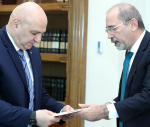You are here
A solution for Mideast problems
Jan 15,2014 - Last updated at Jan 15,2014
The UN Year for Water Cooperation is behind us. Before long, in 2015, the UN Decade for Water for Life will be over.
The UN recognition of water issues has succeeded in drawing the attention of policy makers to this critical sector in the last few years.
Much of the discourse has focused on the centrality of water to economic development, sanitation and health. There is, however, reluctance to discuss interdependence between water and peace.
The Middle East has lost many opportunities due to its failure to recognise the significance of the water and peace equation.
In June 2010, relations between Jordan, Lebanon, Iraq, Syria and Turkey were very healthy.
Except for Iraq, which had constitutional limitations in entering into any international agreement, the remaining four countries formed a Quadrilateral Free Trade Area.
This covered cooperation in energy, trade, transit and industry.
The region experienced fast integration of trade and economies. However, with the crisis in Syria in early 2011, the experiment collapsed.
There was a similar situation in Central America in the 1980s. All the countries, including Nicaragua, El Salvador, Guatemala and Honduras were involved in warfare with each other.
However, when Oscar Arias was elected president of Costa Rica, he created a window of opportunity by bringing the heads of all the governments together to agree on peace, stability and non-interference in each other’s politics.
Immediately following the Arias Plan, the Central American governments engaged in economic cooperation agreements, just as the Middle East governments had initiated the Quadrilateral Free Trade Area in 2010.
However, the Central American countries did not stop at trade. They moved on to foster cooperation in joint management of water resources in the region. This helped consolidation of the peace process.
Today, there is no risk of war between countries in Central America.
In West Africa, Senegal and its neighbours had similar experience. There was a border dispute between Senegal and Guinea.
However, once Guinea joined the Senegal River Basin Organisation, the conflict disappeared.
In fact, the Senegal River Basin Organisation has been instrumental in resolving ethnic conflicts between Senegal and Mauritania.
Empirical evidence in South America, Southern Africa and South Asia shows that water and peace are interdependent.
When water drives peace and good neighbourly relations, experience all over the world shows that riparian countries move to a much higher level of cooperation and friendship than they could imagine otherwise.
Mere trade liberalisation is not enough, since it can be switched on and off easily. Since water is at the core of life systems, a decision to cooperate in this sector has implications for electricity, agriculture, urbanisation, livelihood, migration and political stability.
Looking back, if Jordan, Lebanon, Syria and Turkey had added one country, Iraq, to the framework of cooperation, they would have taken the cooperation process to the core of their economies and polities.
It would have helped them build mutual confidence in a serious way.
It would have also made trade-offs possible between water and significant issues such as transit routes, hydro-electricity and political stability.
In this case, Turkey would have had a totally different approach to its relationship with Syria and Iraq.
Also, Syria would have found it necessary to value its relationship, not only with Iraq and Turkey, but also with Jordan and Lebanon.
This could have potentially led to political stability in Lebanon and the resolution of the Yarmouk River issue with Jordan.
It would have been an opportunity to make another future possible, which the region lost.
A new report by Strategic Foresight Group, a think tank based in India, demonstrates that any two countries engaged in active water cooperation do not go to war for any reason whatsoever, including those related to ideology, borders, history and economy.
Europe realises this. That is why economic integration in Europe has been accompanied by integrated management of water resources.
Also, as soon as the Balkan wars got over in 1999, and a small window of opportunity was created for peace, the successor states of former Yugoslavia decided to initiate cooperation in the management of the Sava River.
And after the end of the Cold War, one of the first decisions taken by the East European countries was to join the Danube River Commission.
If the leaders of the Middle East countries recognise the strong equation between water and peace, even now they can make a fresh beginning.
Currently, there is a window of opportunity in the relationship between Iraq and Turkey, despite challenges.
If the two governments engage in confidence-building measures over Tigris and Euphrates, they can create the possibility of including Syria at a later stage in their cooperative framework.
It will also be important to include Jordan and Lebanon, as they share important rivers with Syria.
If indeed a regional cooperation mechanism among Iraq, Jordan, Lebanon and Turkey comes into existence for water resources, it will eventually be instrumental in bringing about comprehensive peace across the Middle East.
The writer is executive director of the Strategic Foresight Group, a Mumbai based think tank. She contributed this article to The Jordan Times.











